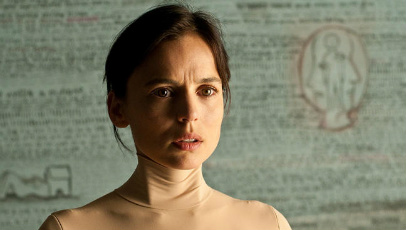Pedro Almodóvar is a world-renowned cinematic master at interlacing a multitude of plot threads and themes into a discernable and absorbing piece of filmmaking with a seemingly blasé attitude. His latest film, The Skin I Live In, personifies that applaudable ability further.
The Skin I Live In is a gloriously twisted and inherently psychological take on Thierry Jonquet’s short story Mygale: an almost Frankensteinian-esque fable centering on one’s ability to harbour wicked control through science. It tells the story of Robert Ledgard (Antonio Banderas, who was always Almodóvar’s first choice), a highly successful plastic surgeon who, after a series of tragedies and shortcomings, experiments with transgenesis in the hope of creating burn-proof skin. His patient is Vera (Elena Anaya), a woman kept captive in his extravagant home.
Almodóvar takes full advantage of a non-linear narrative style to leap between the present, the past and several characters’ points of view in the flick of an eye, taking the audience on an elaborately conceived and well executed thriller-come-love story. Not only does this help in maintaining a perfectly balanced plot that revels in an extraordinary level of depth, but it also helps to keep the audience on edge, making the unexpected twists and turns hit all the harder.
As cinephiles familiar with Almodóvar’s filmography – in particular his darker output, namely Bad Education and Live Flesh – and accomplished style have come to expect, the production values are as high as ever. However, this time the direction, and more importantly Jose Luis Alcaine’s cinematography, feels much more refined and subdued, effectively and necessarily downplaying the already eccentric narrative elements. Alcaine’s intriguing choices in cinematography manages to capture the twisted yet strikingly humanitarian themes beautifully, presenting an elaborately layered stream of images that excellently compliment Robert’s own layered existence.
The stage sets, particularly that of Robert’s mansion, are elaborately constructed to create a labyrinthine effect, where the audience are left to their own imagination and presupposition. That is, however, until the final act, where the fragments all fall into place in a spectacularly marked fashion. Almodóvar’s well-placed clues and superb attention-to-detail neatly pay dividends. Alberto Iglesias’ unnerving score, too – a subtle blend of classical and upbeat, electronic sounds – plays against the material exquisitely, adding another level of vindictiveness to Robert’s crumbled state of mind.
Impeccably, Robert’s motivations and intentions are gradually revealed, allowing Banderas to mould his performance around his character’s many different stages of emotion and insanity. He ranges from an initial likeable benevolence to eventual psychopathic menace. Marisa Paredes, who returns to work with Almodovar for the seventh time, has an enticingly unscrewed role as Robert’s maternal housemaid and servant – a truly suspect relationship that benefits from its lack of spotlight.
Anaya has this time been elevated from a bit part in Talk to Her to a leading role. She embraces the absurdity and listlessness of Vera; her disorientation and anguish are pulled to the forefront bit by bit as we are made fully aware of her horrifying ordeal. As the story unravels, the plot thickens and Vera develops a heightened level of confidence and grasp over Robert, which represents how scientific power doesn’t always win over a humanist’s natural abilities. Anaya’s performance becomes more and more unnerving, which plays up the absurd scale brilliantly.
It may seem that Almodóvar has created characters and scenarios too outlandish and emotionally confused to allow investment, but we find ourselves tangled up in Robert’s web. From this position, the characters seem all the more intriguing: so much so that we feel for every single person involved, despite their actions and intentions. In turn, by keeping the pace spry and not revealing too much too soon, Almodóvar ensures the audience remain immersed throughout, despite the increasing absurdity of the central narrative arc.
On the other hand, several key moments don’t play out as accurately as they demand, and the end is a little more tame than audiences have come to expert from Almodóvar. Instead of leaving open-ended plot strands with questions unanswered, he chooses to tie things up rather neatly in the hope the story will have a more underplayed and resonant impact on viewers. These, however, are minor squabbles, and rarely detract from the experience as a whole.
While the more mature themes and plot scenarios present in The Skin I Live In mark somewhat of a departure for Almodóvar, this is still another magnificent addition to his very impressive roster. Again, he proves himself as a director able to tackle any material and make it sumptuously rich in narrative, character development and style like no other. This is must-see cinema at its finest. A 21st century cross-genre treasure.

[…] anticipated), we couldn’t be more chuffed at the nominations for Drive, Shame, 50/50 and The Skin I Live In, four of our favourite films of the past […]
LikeLike
[…] [Review] […]
LikeLike